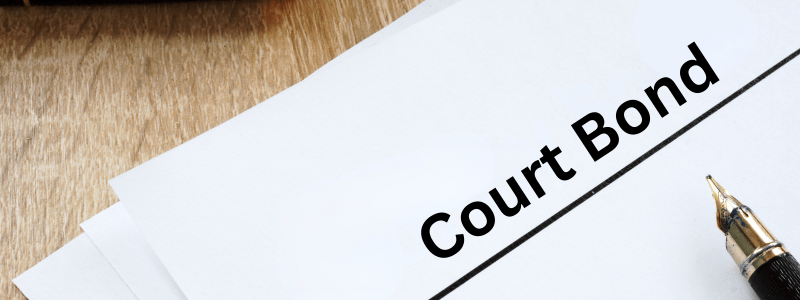
In the realm of legal proceedings, court bonds stand as a crucial component in ensuring financial security and compliance with legal obligations. Understanding what is Court Bond and the process of acquiring them is essential for individuals navigating the intricate pathways of the legal system.
Understanding the Basics of Court Bonds
Court bonds are financial instruments that serve to guarantee the fulfillment of obligations imposed by the court. They assure parties involved in legal proceedings that financial damages resulting from non-compliance with court orders or judgments will be covered.
Importance of Court Bonds in Legal Proceedings
In the context of legal proceedings, court bonds hold paramount importance. They offer protection to both plaintiffs and defendants, ensuring that financial losses incurred due to non-compliance with court orders are mitigated. Additionally, court bonds facilitate the smooth progression of legal matters by instilling confidence in the judicial process.
Types of Court Bonds
1. Plaintiff’s Court Bonds
Plaintiff’s court bonds, also known as plaintiff’s attachment bonds or injunction bonds, are obtained by plaintiffs to secure court-ordered injunctions or attachments. These bonds serve as a guarantee that the plaintiff will compensate the defendant for any damages suffered if the court later determines that the injunction or attachment was wrongful.
2. Defendant’s Court Bonds
Defendant’s court bonds, often referred to as defendant’s appeal bonds or supersedeas bonds, are procured by defendants to stay enforcement of a judgment pending appeal. By obtaining a defendant’s court bond, the defendant can delay the execution of the judgment until the appellate court reviews the case.
3. Appeal Court Bonds
Appeal court bonds are required when a party wishes to appeal a court decision. These bonds ensure that if the appellate court upholds the original decision, the appellant will comply with the judgment. Appeal court bonds provide financial security to the appellee while the appeal is pending.
4. Fiduciary Court Bonds
Fiduciary court bonds, also known as probate bonds or executor bonds, are mandated when an individual is appointed as a fiduciary to manage the assets of another party, such as an estate or trust. These bonds safeguard the interests of beneficiaries by ensuring that the fiduciary performs their duties faithfully and honestly.
How to Obtain a Court Bond

1. Identify the Type of Bond Needed
The first step in obtaining a court bond is to determine the specific type of bond required for the particular legal matter at hand. Consulting with legal counsel can provide clarity on the appropriate type of bond based on the circumstances of the case.
2. Contact a Surety Bond Company
Once the type of bond has been identified, the next step is to reach out to a reputable surety bond company. These companies specialize in providing various types of bonds and can offer guidance on the application process.
3. Application Process
The application process for obtaining a court bond typically involves completing forms provided by the surety bond company and submitting relevant documentation. This documentation may include financial statements, proof of identity, and details of the legal matter requiring the bond.
4. Underwriting and Approval
After the application is submitted, the surety bond company will conduct an underwriting process to assess the applicant’s financial stability and creditworthiness. Based on this evaluation, the company will determine whether to approve the bond application.
5. Bond Issuance
Upon approval, the court bond will be issued to the applicant, outlining the terms and conditions of the bond. It is essential to review these terms carefully to ensure an understanding of the obligations associated with the bond.
Costs Associated with Court Bonds
The cost of obtaining a court bond varies depending on factors such as the type of bond, the amount of coverage required, and the applicant’s financial standing. Court bond costs typically involve a premium, which is a percentage of the bond amount, paid to the surety bond company.
Conclusion
In conclusion, court bonds play a vital role in the legal landscape, providing financial security and compliance with court orders in various legal proceedings. Understanding the different types of court bonds and the process of obtaining them is essential for individuals involved in litigation, ensuring smooth navigation of the complexities of the legal system.
FAQs
1. Are court bonds the same as bail bonds?
No, court bonds and bail bonds serve different purposes. Court bonds ensure financial protection in legal proceedings, while bail bonds secure the release of a defendant from jail pending trial.
2. Can anyone apply for a court bond?
Yes, individuals or entities involved in legal proceedings may apply for a court bond. However, approval is subject to the evaluation of the applicant’s financial standing by the surety company.
3. Are court bond costs refundable?
No, court bond costs are non-refundable. They are paid to the surety company to secure the bond and ensure financial protection in legal matters.
4. How long does it take to obtain a court bond?
The time frame for obtaining a court bond varies depending on factors such as the type of bond needed, the complexity of the case, and the efficiency of the application process. Generally, it can take anywhere from a few days to a few weeks.
5. Can court bonds be canceled?
Yes, court bonds can be canceled under certain circumstances, such as the resolution of the legal matter or upon the request of the party who obtained the bond. However, cancellation may be subject to penalties or fees.
To explore further legal strategies for protecting your assets, check out our article on DOES A TRUST PROTECT YOUR ASSETS FROM LAWSUITS?
